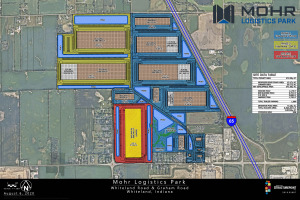
North Split construction, traffic closures to begin in December
The North Split project, which was first announced in 2017, will reconfigure the Interstate 65/Interstate 70 interchange on the northeast side of downtown.

The North Split project, which was first announced in 2017, will reconfigure the Interstate 65/Interstate 70 interchange on the northeast side of downtown.
Work travel represented 21% of the $8.9 trillion spent on global travel and tourism in 2019, according to the World Travel and Tourism Council. How much of that business will return after the pandemic is uncertain.
The one-semester program, which includes both on-the-road driver training and academic instruction, is set to begin in January at Ivy Tech campuses in Indianapolis, Lafayette, Fort Wayne, Evansville and Lawrenceburg.
The Carmel-based company said its results for the first nine months of 2020 have been “significantly impacted by the COVID-19 pandemic.”
Local officials say state and federal authorities in recent weeks have showed little interest in helping them push for the tougher measures needed to control the pandemic.
The pain is evident across the globe, where airlines have rescinded earlier forecasts that called for traffic to gradually increase toward normal levels during the fourth quarter.
Combined with earlier losses reported by Delta and United, the four largest U.S. airlines have lost at least $10 billion in each of the last two quarters. A recent uptick in passengers, however modest, has provided some hope.

The ideas the city received fell into four broad categories: public charging for e-bikes and scooters, public charging for electric vehicles, shared transit services and placemaking.
People have incrementally returned to the skies, but in far fewer numbers than normal. The seven-day average as of Sunday was 871,513, or 35.6% of the equivalent week last year.

IndyGo has been evaluating possible expansion sites around the city in recent months because it has run out of room at its West Washington Street headquarters.
Aviation leaders had hoped to be included in a broader pandemic relief package, but once it became clear that the White House was done negotiating, industry leaders quickly shifted focus to a stand-alone bill.
House Democrats on Friday proposed a new $28.8 billion bailout for the airline industry after the carriers began furloughs of more than 32,000 workers to cut costs during a pandemic that has devastated air travel.
U.S. airlines said they will begin furloughing tens of thousands of employees on Thursday, but they left open the possibility that workers could be called back if a federal relief package is reached in the next few days.
The spinoff company, Red Technologies, is built around proprietary software that Spot launched in 2015 to help connect shippers, trucking companies and drivers for the purpose of freight brokering.
The Air Line Pilots Association said Monday that the deal will allow United to spread a reduced amount of flying across the airline’s 13,000 pilots to save jobs at least until June.
While the call for testing isn’t new, the outlook has turned increasingly grim for airlines taking stock of a disappointing summer with rising infection rates and restrictions dashing hopes for a recovery.

Dallas-based Mohr Capital has already broken ground on the first building in the master-planned Mohr Logistics Park—a 1 million-square-foot distribution center for Cooper Tire—and has several more in the early planning stages.

After issuing a request for information and performing an infrastructure analysis, the city said it found that the existing charging stations “perform at a level below what is considered viable for reuse.”
A fire that damaged or destroyed about 20 big trucks at a south-side Indianapolis business is being investigated as arson. The blaze was reported about 3:30 a.m. Thursday at M&K Truck Center, 1401 Harding Court. The business said it was offering a $30,000 reward “for information leading to the arrest and conviction of those responsible […]
Qantas, among the latest to advertise a flight that departs and arrives at the same airport with no stops along the way, said the trip sold out less than 10 minutes after going on sale.